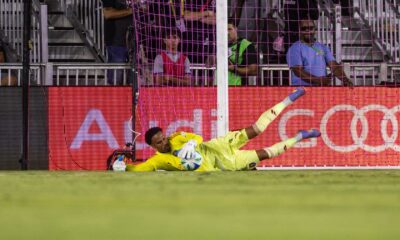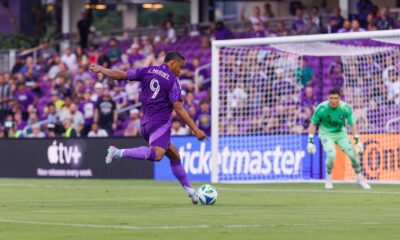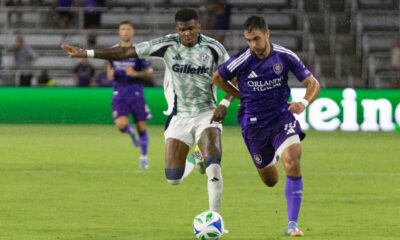Orlando City
Orlando City vs. LA Galaxy: Player Grades and Man of the Match
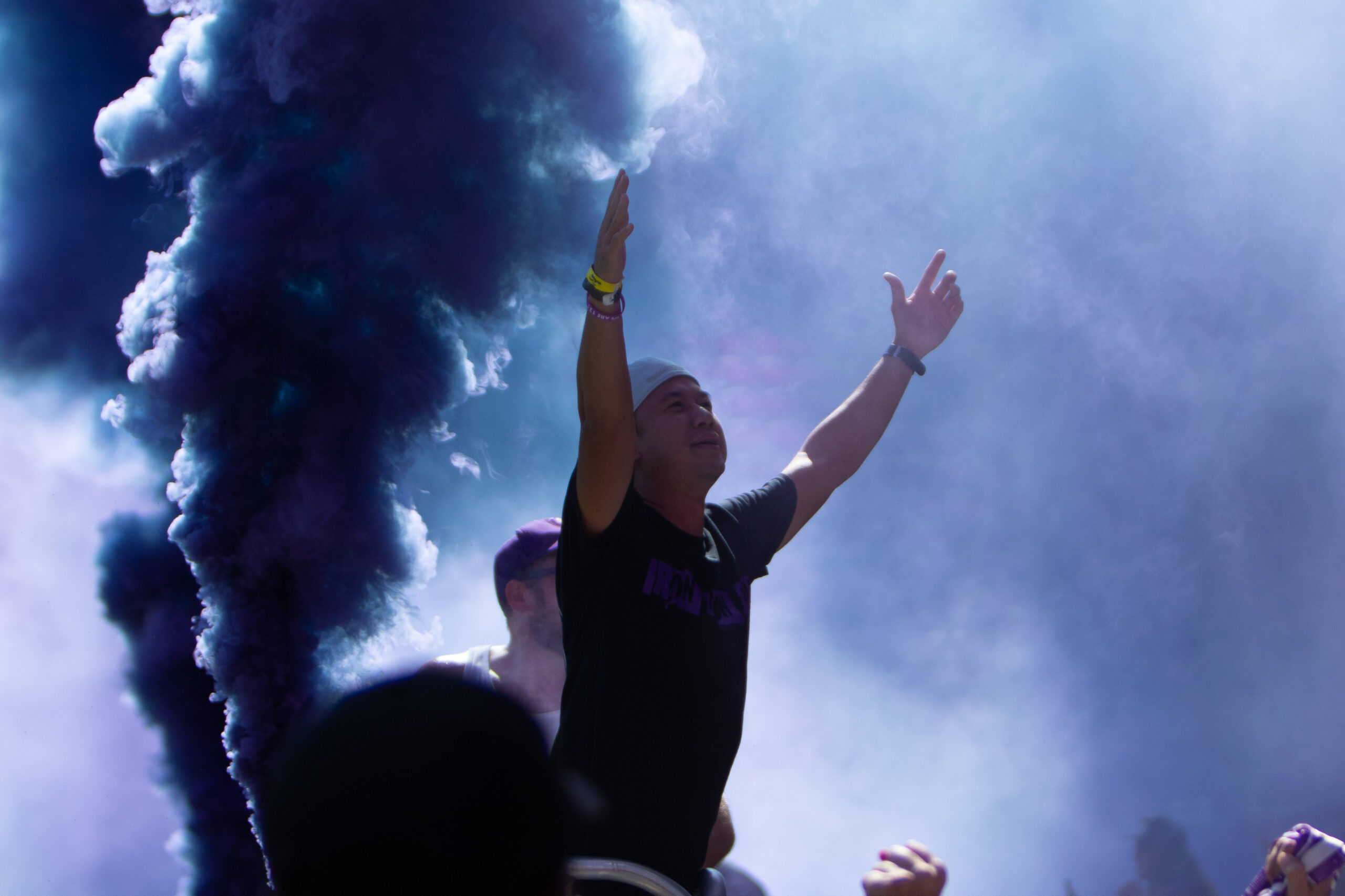
Orlando City’s trip to Los Angeles took on added importance after fumbling away points at home to FC Cincinnati a week ago. The Lions have historically done poorly on the west coast, especially in the state of California, so I wasn’t too optimistic about them bringing points home, let alone three. Yet the team dug in and kept concentration throughout a tight, nervy affair, playing much of it in their own third. Orlando City’s 1-0 win over the Galaxy can be seen as a “makeup win” of sorts after the Cincinnati game, because fans may have expected those results to be reversed when looking ahead at the schedule.
Let’s get to the individual performances in a vital road victory.
Starters
GK, Pedro Gallese, 8 — Thanks to the team in front of him, El Pulpo wasn’t called on that often to make big saves, but he did so when needed. Much like the Lions at home against Cincy, the Galaxy weren’t sharp in the final third. Credit some of that to the defense, of course. Gallese finished with three saves. One was a good one on a shot through traffic by Chicharito. He couldn’t control the rebound, but it luckily was a bit out of Kevin Cabral’s reach for the put-back. He did well on a smashed shot/cross at the near post by Efrain Alvarez in the second half, sacrificing a sensitive part of his body to smother a dangerous ball in that could have gone anywhere. It wasn’t the Octopus’ best passing game at just 53.6% (and just 8/20 on long balls) but it was often a case of “anywhere will do,” and you don’t take chances on the road — especially with Chicharito on the field.
D, Joao Moutinho, 6 — This wasn’t the Portuguese left back’s strongest game, but he was asked to do a lot, leading the team in touches (68 — 11 more than the next closest Lion, Cesar Araujo) and being tasked with watching Douglas Costa and Alvarez. He had a couple of bad giveaways that led to chances, and he was roasted by Alvarez on the play mentioned above. Moutinho was dispossessed twice and had three bad touches. I didn’t like the yellow card, which came on a ball he won cleanly and his opponent got there late and got himself clipped on the follow through when he wasn’t abnormally extended. Some of his missteps come down to volume due to being on the ball so often. That doesn’t excuse his lack of connectivity in the final third — on one occasion he was indecisive about getting to the end line and got his cross blocked out for a corner. Still, Joao had two tackles, an interception, two clearances, and a blocked shot. He had one dribble and passed at an 85% rate, but was just 1-for-4 on long balls and 0-for-2 on crosses.
D, Robin Jansson, 6.5 — The Beefy Swede had a workmanlike effort, helping keep Chicharito and Cabral quiet in front. It wasn’t a perfect game, with Jansson passing at just 82.6%, which was the lowest on the back line. He was 2/4 on long balls but didn’t realease those really killer line-breaking passes we’re used to seeing and he was conservative about jumping into the play, which was probably by design. He blocked three shots and had three clearances to go with his two interceptions. He had the fewest touches of the back line players with a quietly solid performance.
D, Antonio Carlos, 8.5 (MotM) — The Brazilian defender had a monster game as the most active member of Orlando’s back line. He led all players with 14 clearances, winning vital balls in the air on a huge number of LA set pieces throughout the match. AC chipped in two tackles, an interception, and a blocked shot. His 50 touches were fourth most on the team, behind Moutinho and the double-pivot players — Araujo and Sebas Mendez. He had a great passing rate of 89.3%, with a lot of pressure in his face, and completed five of his eight long balls. He also attempted one of Orlando’s six shots, although the corner kick cross was behind him so he was unable to put it anywhere near the target.
D, Ruan, 6 — One of these days, Ruan’s going to have a fantastic day crossing the ball and it will be glorious. That wasn’t Saturday. Two extremely wasteful crosses perhaps cost the Lions a chance to put the game away. One was way behind his teammates and the other was too far in front. The speedy Brazilian was accurate on one of his three crosses and two were just awful, including one directly at the keeper with Facundo Torres and Ercan Kara in the process of beating their defenders in the box. That said, his passing rate was good (90%) and he did have the secondary assist on Torres’ goal with the pass to Kara. He had one tackle and one clearance but struggled to keep Cabral quiet or close down Victor Vazquez at times, and he gave up a dangerous set piece, although the yellow card was overkill by the referee. He had no shots or key passes.
MF, Sebas Mendez, 7 — The Ecuadorian got his first start of the season and was active, but there was a little rust showing at times with regard to positioning above his own penalty area. He did his job defensively, finishing with two tackles, an interception, two clearances, and a block. He passed well, as usual, at an 89.2% rate, hitting on one of his two long balls but was unsuccessful on his lone cross. He and Araujo helped funnel most of the LA attack to the wings and it was a good match overall for Mendez.
MF, Cesar Araujo, 7.5 — The kid in the central midfield just keeps on delivering. Araujo was active on defense against a good group of attackers, with a team-high three tackles to go with two interceptions and a clearance. His passing rate of 93.9% led all Lions who had at least five attempts and he was on the ball more than any Orlando player except Moutinho. Six of his seven long balls were accurate and he had one key pass. He had an opportunity to score his first MLS goal on the counter but the shot was deflected away at the last second. Araujo received his third yellow card in four matches, taking one for the team. His tactical foul to break up a late LA rush can largely be blamed on substitute Benji Michel trying to take on Julian Araujo one-on-one, and losing that battle, rather than taking the ball to the corner to run some clock. This score could have been higher but there were a couple of times he was a tad late closing down that could have prevented some entry balls.
MF, Facundo Torres, 7.5 — The Young Designated Player is just starting to settle in and get comfortable and now he’ll leave for the international window. Torres opened his account with a no-doubt-about-it headed finish after putting himself into the perfect space for Kara’s cross. He had two of Orlando’s six shots and one of the club’s two shots on target. Torres passed at an 81.3% clip, and was accurate on one of his two crosses and two of his five long balls. He contributed a tackle, two interceptions, and a clearance on defense. He also won an aerial. His three unstable touches were a slight blemish on an otherwise great outing.
MF, Mauricio Pereyra, 6 — It was another mixed game for the captain. Although he did some things well, there is just a bit of inconsistency marring his game right now. He continues to have at least one dangerous giveaway in his own end that is seemingly preventable. His passing rate of 76.5% isn’t good enough, and he went just 1-of-5 on long balls. He was dispossessed once and had three bad touches. And his set piece delivery was once again not precise enough. However, there were good things too. He created two scoring chances (a shared team high), was 1/2 on crosses and 1/2 on through balls, won a tackle, and drew two fouls on the opposition.
MF, Junior Urso, 6.5 — The Bear continues to do the selfless things on the field to help the team, even if sometimes those aren’t rewarded, such as when he unlocked the LA defense with a beautiful through ball for Ruan, only to see his fellow Brazilian waste the chance with a poor cross. Playing as a false wing, Urso helped divert the LA attack to the wider areas but was his usual pesky self, winning three fouls. He chipped in two tackles and two interceptions. His 81.5% passing rate was good considering he was playing a little further up the pitch, and he created two scoring chances and was a perfect 4/4 on long ball accuracy. I knocked a tiny bit off his grade for not getting a shot attempt (considering his position) and for being dispossessed three times, but it was yet another solid match for Urso.
F, Ercan Kara, 7 — Despite being isolated much of the match due to the huge disadvantage Orlando had in possession, it was a quality game from the Turkish-Austrian Designated Player. His first MLS assist set up the game-winning goal with an inch-perfect cross to Torres. He won three aerials, created a scoring chance, had one of Orlando’s six shot attempts, and won two fouls. His 66.7% passing rate seems low but it was a small sample size with only nine attempts. He helped out defensively with a pair of clearances and did well to press LA’s central midfielders into playing up the wings.
Substitutes
D, Kyle Smith (68’), 6 — El Soldado (or “The Accountant,” if you prefer) came on for Ruan and even though he was tasked with being solid defensively, he still managed to get one of Orlando’s two shots on target, although it was right at the goalkeeper. His passing rate of 71.4% wasn’t much to write home about but he did complete one of his three long balls. He provided one tackle and a clearance and the Lions’ right side seemed a bit calmer defensively after he came on.
F, Benji Michel (68’), 5.5 — Michel came on to spell Kara, providing fresh legs for a potential late counter opportunity at an insurance goal. Despite being on the pitch for only 22 minutes and five more of injury time, he still had three poor touches, including the one that allowed LA to counter and created the need for Araujo to take a tactical foul to slow down the attack. He completed seven of his nine passes, won an aerial and had a defensive zone clearance. He didn’t manage a shot or a key pass.
D, Rodrigo Schlegel (79’), N/A — The Argentinian defender came on for Pereyra to get an extra defender on the field and he basically ate up space and kept the middle of Orlando’s defensive third congested, but there’s not much to grade him on. He had only one touch of the ball, registered no defensive stats and was unsuccessful on his lone pass attempt. The change of shape did allow Orlando to prevent any late danger from the Galaxy, though.
F/MF, Tesho Akindele (84’), N/A — The Canadian wasn’t on the field long enough in relief of Torres to fairly evaluate, but he did his job over the final six minutes of normal time and five minutes of stoppage time. He managed seven touches and completed all four of his pass attempts to help the Lions eat up the remaining time.
That’s how I saw the performances in an important Orlando City road victory. Let me know where you think I got it right or wrong in the comments section and vote for your Man of the Match in the poll below.
Polling Closed
| Player | Votes |
| Pedro Gallese | 6 |
| Antonio Carlos | 53 |
| Cesar Araujo | 2 |
| Facundo Torres | 16 |
| Other (Tell us who in the comments) | 1 |
Orlando City
Converting More Big Chances Could Propel Orlando City’s Season Into An Epic Universe
An analysis of Orlando City’s conversion rate on big chances and an evaluation of the impact of a small improvement .

If you could all hop in the Wayback Machine with me, I would like to take you all the way back to Sunday, May 18, 2025. It was a glorious day, punctuated by a 3-0 victory over Orlando City’s southern rivals Inter Miami. The Five Takeaways article about that game was pretty awesome too, and in that article, the dashingly handsome and spellbindingly brilliant author noted that Orlando City “could, and probably should, have scored five or even six goals” against Miami.
You probably surmised that the author of that Five Takeaways article was me, and I appreciate your immediate recognition of my handsomeness and brilliance. I am also pretty confident that you believe that Orlando City should have scored more than three goals as well, and I am here to tell you that the eye test and the tracking data agree. The wonderful site fotmob.com tracks a statistic coded by analysts from Opta called “big chances,” which they define on their frequently asked questions page as:
A situation where a player should reasonably be expected to score, usually in a one on one scenario or from very close range when the ball has a clear path to goal and there is low to moderate pressure on the shooter. Penalties are always considered big chances.
The key words in their definition are “reasonably be expected,” and so, while the word ‘expected’ is in this definition, do not confuse “reasonably be expected” with “expected goals” (xG). I think of expected goals more like a geography problem, kind of like the game show Where in the World is Carmen Sandiego? Was that an excuse just to mention that one of my best friends was a contestant on that show in 1994 and won a trip to Orlando? A gentleman never tells.
Back to the geography problem, expected goals is really just a mapping exercise, mapping conversion percentages to locations all over a soccer field and then summing up all the shots taken from those locations in a game. By that measure, fbref.com had Orlando City with an xG of 2.9 against Miami, extremely close to the actual output of three goals. Earlier in the season, however, the xG tracking was 1.6 against Toronto…but the Lions scored four goals.
There are countless examples of the real results not matching the xG. While I value xG and just finished reading a great book called How To Win The Premier League: The Inside Story of Football (soccer)’s Data Revolution, which details the history of expected goals and how the author — the former director of research at Liverpool — helped build the first analytics department at a Premier League club using xG as a foundational measurement tool, I still think xG needs to be used alongside other measures and cannot stand alone by itself.
One of the main reasons I think it needs to be combined with other data is that xG requires a shot to be taken, and sometimes that does not happen. Consider Orlando City’s third goal against Miami, if Duncan McGuire’s cross had gone untouched then the xG on that play would have gone from 0.56 to 0.0, because without a shot attempt there is no shot location, and no map coordinates to use to find the xG for that area of the field.
This takes us back to that definition of big chances, which notably does not include a requirement for a shot to be taken. Duncan McGuire’s pass clearly created a chance to score, and that pass, combined with the perfectly timed run from Dagur Dan Thórhallsson, meant that Orlando City had a great opportunity to score from a location where anyone with eyes would think that “a player should reasonably be expected to score.” If Thórhallsson had whiffed, then the xG would have said no sir, you get 0.0 xG, even though everyone who watched that pass would have said, “Oh my, he should have scored that, what a big chance missed.”
Note: Thórhallsson did not miss, and it was glorious.
According to Opta’s tracking, Orlando City had eight big chances in the game against Miami. Which sounds closer to your memory of that match: Orlando City’s xG was 2.9 or Orlando City created eight big chances to score? I think most people probably think of the latter and remember the breakaways and the close-range opportunities and how it seemed like Orlando City had so many clear chances to score.
Looking at the 2025 season to date, the Lions are tied for the MLS lead with 50 big chances thus far, and just as against Miami, you can see that their conversion rate on those big chances has not been great:
| Club | Big Chances | Big Chances Converted | Conversion Rate |
|---|---|---|---|
| San Jose | 50 | 20 | 40% |
| Orlando City | 50 | 14 | 28% |
| Chicago | 46 | 18 | 39% |
| Columbus | 46 | 14 | 30% |
| Nashville | 41 | 12 | 29% |
| Vancouver | 40 | 21 | 53% |
| LAFC | 39 | 14 | 36% |
| Miami | 39 | 20 | 51% |
| Minnesota | 39 | 14 | 36% |
| Portland | 37 | 16 | 43% |
| MLS Average* | 34 | 12.4 | 37% |
- *The MLS Average is the average of every team except Orlando City
If you were wondering, yes, 28% is among the league’s worst conversion rates on big chances. It is tied for second worst, ahead of only Austin, which must be driving its fans up the wall with a 19% conversion rate on 31 big chances. Maybe the release of Wicked at the end of 2024 put the kibosh on good things happening to those in green for a while. Vancouver, on the other hand, is out there Burning Blue like Mariah the Scientist (contemporary pop song alert), converting a league-leading 53% of its big chances.
For Orlando City, however, 28% feels right. It feels terrible, but it also feels right. How many times did it seem like it would be harder not to score than to score, but then the Lions went ahead and did not score? Luis Muriel leads the team with 12 big chances missed (second most in MLS), and while it takes an extreme amount of skill and work to get into position to miss chances, the reality is that 12 times independent analysts thought Muriel should reasonably have been expected to score and he did not.
Anytime there is a lower-than-average performance there is always a question of whether that performance is reality or if there is a regression to the mean coming. In this case, regression to the mean would actually be positive, or something more akin to ascension to the mean. If Orlando City performs at a conversion rate similar to that of the rest of the league, the Lions will score about one additional goal per every 10 big chances, or an additional five goals over their next 50 big chances generated.
Considering that the Lions generated those 50 big chances in 14 games, it is easy math to double that and put Orlando City at 100 big chances after 28 games at the current pace. That extra five goals, were it to happen and the team continued to similarly convert its “small chances,” would net the team 32 goals in the next 14 games, and take the team to 59 after 28 games, with six more games still to play in the season.
Readers of UpRoar, the weekly newsletter for The Mane Land’s Buy Me a Coffee subscribers, which you can subscribe to by clicking this link, will know that Orlando City’s offense is already on pace to break the club’s MLS goal-scoring record, which is…wait for it…59 goals, and so, if the Lions could start converting more of their big chances, then the 2025 team could not only break that record but smash it — like, epically smash it like the Super Smash Brothers.
And speaking of…what better way to celebrate today’s official opening of Epic Universe but to imagine Óscar Pareja and the coaching staff out there training their goal-scoring dragons and super Marco and Luis-gi to tame the dark world of opposition defenses with their Harry Potter-esque offensive wizardry?
That would be epic, and if you are asking me what the coaching staff should do, that is what I pick.
Orlando City
Orlando City vs. Nashville SC: Five Takeaways
Here’s what we learned from a regrettable 3-2 loss to Nashville SC in the U.S. Open Cup.
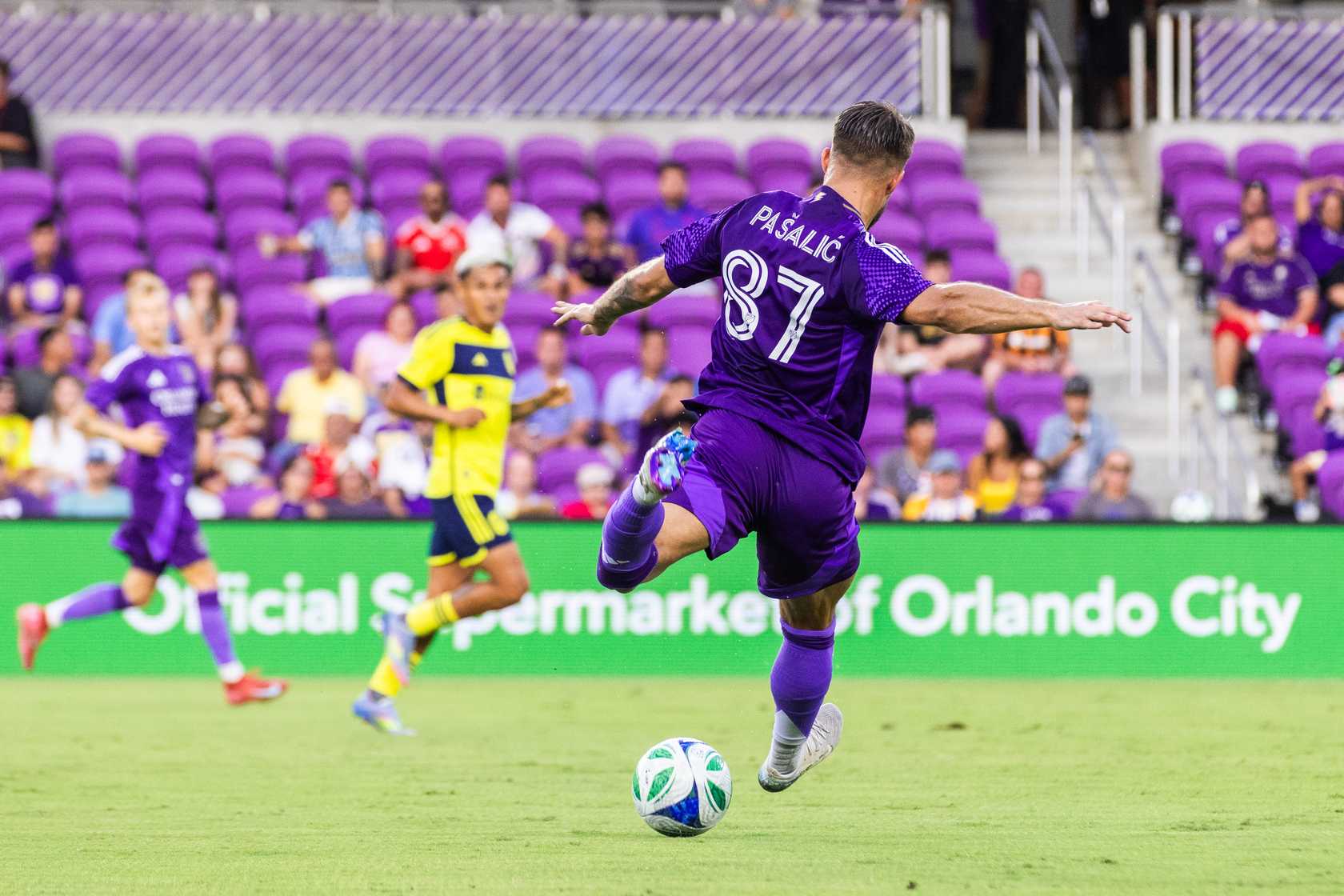
Orlando City came into the U.S. Open Cup Round of 16 match against Nashville SC riding a 12-match unbeaten streak, including a 3-0 thrashing of in-state rival Inter Miami on Sunday. The Lions’ next match against the Portland Timbers looms on Saturday. Despite the glut of matches, Orlando fielded most of the normal starters in an effort to advance. Unfortunately, the Lions fell 3-2 to the visitors to end any hopes of another Open Cup trophy. Here are my five takeaways from a disappointing midweek match.
Pasalic Power
Marco Pasalic decided he wanted to do it all himself on the first goal. As he has so often, he went up the right side before cutting in to the left and burying an absolute rocket of a shot into the back of the net to give Orlando City the early lead. It’s the type of goal we’ve come to expect from Pasalic since his arrival and it was his first U.S. Open Cup goal on his debut in the competition. Unfortunately, he’ll have to wait until at least next year for his next USOC match.
Tired Starters
One could see that the Orlando City defenders were running on tired legs. It seemed obvious in the two goals given up in the first half. The first goal bounced around in the box and then off of Rodrigo Schlegel for an own goal. On the second goal, no one stepped to Ahmed Qasem at the top of the box, allowing him to put an easy shot into the bottom right corner of the goal.
Alex Freeman was near Qasem, but had to anticipate a pass to the wing. Cesar Araujo trailed Qasem passively, and he was not in position to do anything when the Nashville attacker opted to take the space the defense gave him. On the left side, Nashville’s attackers torched David Brekalo from the start. The defense simply looked tired, including Araujo in central midfield.
Enrique’s Equalizer
Orlando City came back out after halftime looking much better on the ball. The tactical adjustments worked as the team pushed for an equalizer. Working along the right side of the attack, Freeman sent the ball to Pasalic, who smartly provided a one-touch pass to Ramiro Enrique for the finish. It was a well-worked attack and a beautiful finish.
Handball Debacle
In the 72nd minute, there was a handball in the box on Nashville’s Wyatt Meyer. Unfortunately, referee Joshua Encarnacion did not make the call. To make matters worse, he then gave Freeman a yellow card for dissent a little further down the field seconds later. There is no video review in the U.S. Open Cup, so there was no second look available to make the correct call. It was a double whammy of a situation. To then pour salt on the wound, Meyer scored Nashville’s third goal to give the visitors the lead again.
Taking it Too Seriously?
Oscar Pareja takes the U.S. Open Cup seriously. So seriously that he started most of the regulars despite the emotional and physical toll taken in the match against Inter Miami and the volume of minutes they’ve played throughout May every three days. Initially, it looked to be the right decision, but the two first-half goals by Nashville put that into question. The number of minutes played by some of the starters — who will need to play against the Portland Timbers this weekend — may turn one loss into two. That being said, I wanted Pareja to prioritize the Open Cup over the Leagues Cup, and we’ll find out in July and August if that’s the case.
Those are my takeaways from Orlando City’s 3-2 loss to Nashville in the U.S. Open Cup. It was a disappointing result on a night where Nashville didn’t bring their A-squad, but did bring its A-game.
Let us know your thoughts about the Nashville SC match in the comments below. Vamos Orlando!
Lion Links
Lion Links: 5/22/25
Orlando City ousted from U.S. Open Cup, OCB’s Justin Ellis named Player of the Matchweek, Tottenham wins Europa League, and more.
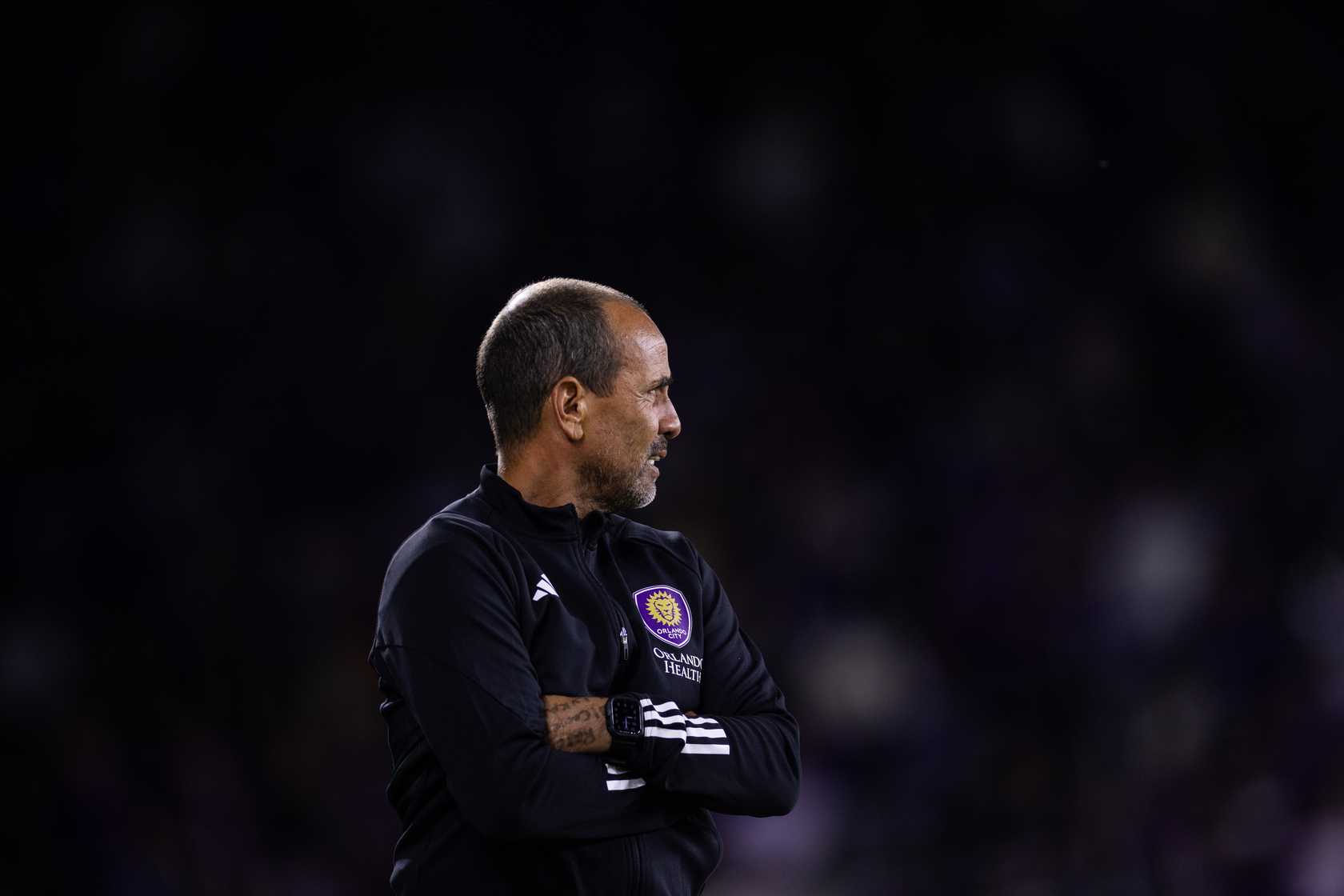
Well, that could have gone better. It’s understandable to feel a bit deflated after Wednesday night’s game, especially after so many positive Orlando City results as of late. The good news though is that we’re another day closer to a holiday weekend that should include some good times or at least rest and relaxation. Let’s dive into today’s links!
Orlando City Eliminated from U.S. Open Cup
The Lions lost 3-2 at home to Nashville SC in the U.S. Open Cup’s round of 16, ending the team’s run in the tournament. Orlando struck first in a rollercoaster of a match, and Ramiro Enrique pulled the Lions level after they fell behind, but rookie Wyatt Meyer scored the winner for the visitors. The loss snapped Orlando’s 12-game unbeaten streak across all competitions and Orlando looked like a team that played five other matches already this month. Orlando will need to shake off this loss as it prepares to host the Portland Timbers on Saturday.
Justin Ellis Named MLS NEXT Pro Player of the Matchweek
Orlando City B midfielder Justin Ellis was selected as MLS NEXT Pro Player of the Matchweek for his role in the team’s 3-0 win over Inter Miami II. Ellis, who turned 18 years old last week, assisted on both of OCB’s first two goals before scoring from the penalty spot himself. It’s been quite the year so far for Ellis, as he also scored six goals in the Generation Adidas Cup to help Orlando win the U-18 title in April. The Young Lions are back in action Friday with a road match against rival Atlanta United 2.
U.S. Open Cup Round of 16 Results
Comebacks were a theme throughout the U.S. Open Cup’s round of 16. Minnesota United took the lead, gave it up, and ultimately advanced thanks to defender Anthony Markanich scoring two late goals to beat St. Louis City 3-2 at Allianz Arena. Markanich was traded from St. Louis to Minnesota last year, adding a little salt in the wound for the visitors. D.C. United and Charlotte FC battled in a back-and-forth match that ended up with D.C. winning the penalty shootout after a 3-3 draw. The match between the New York Red Bulls and FC Dallas also went the distance, with the Red Bulls winning the shootout. The Philadelphia Union won 4-1 against the Pittsburgh Riverhounds to eliminate the last team from outside MLS. The draw for the quarterfinals will take place this morning.
Tottenham Hotspur Wins Europa League Final
Tottenham prevailed in this year’s Europa league final, winning 1-0 against Manchester United in Spain. Brennan Johnson’s goal was enough for Tottenham to end its 17-year wait for a major trophy. It was a bit of an underwhelming finish to what was a fairly exciting knockout stage, and this was United’s only loss in this year’s tournament. Tottenham has now qualified for next season’s Champions League despite currently being 17th in the English Premier League standings.
Free Kicks
- Christian Pulisic reportedly won’t play in the Concacaf Gold Cup so that he can recover from a lengthy season with AC Milan.
- Boston’s NWSL team will play its home games next year at Gillette Stadium due to delays with construction for its eventual home, White Stadium.
- NWSL Chief Marketing and Commercial Officer Julie Haddon will leave the league this summer as part of the league’s restructuring. Chief Sporting Director Tatjana Haenni will exit in October as well.
- After winning the domestic treble in his first season in charge, Barcelona manager Hansi Flick has extended his contract until 2027.
- Real Madrid midfielder Jude Bellingham will undergo shoulder surgery once the Club World Cup is over.
- London City Lionesses were fined for messaging a Southampton player through social media without Southampton’s permission back in August. London City earned promotion this past season and will be the first fully independent women’s team in the Women’s Super League.
That’s all I have for you this time around. I hope you all have a wonderful Thursday and rest of your week!
-
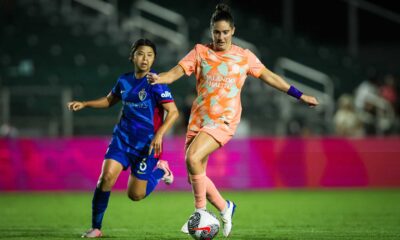
 Orlando Pride2 weeks ago
Orlando Pride2 weeks agoOrlando Pride vs. North Carolina Courage: Preview, How to Watch, TV Info, Live Stream, Lineups, Match Thread, and More
-
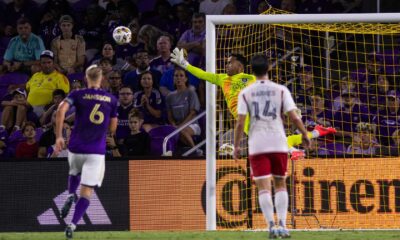
 Orlando City2 weeks ago
Orlando City2 weeks agoOrlando City vs. New England Revolution: Preview, How to Watch, TV Info, Live Stream, Lineups, Match Thread, and More
-
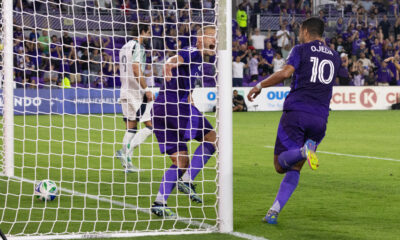
 Orlando City2 weeks ago
Orlando City2 weeks agoOrlando City vs. New England Revolution: Final Score 3-3 as Lions Squander Lead Twice at Home
-
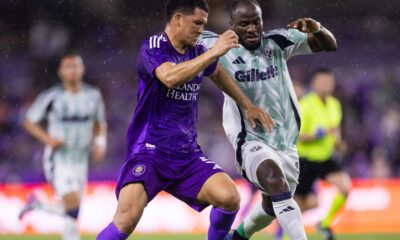
 Orlando City2 weeks ago
Orlando City2 weeks agoOrlando City vs. New England Revolution: Five Takeaways
-
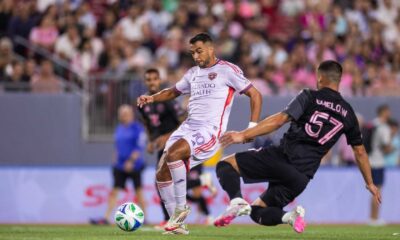
 Orlando City1 week ago
Orlando City1 week agoOrlando City vs. Inter Miami: Three Keys to Victory
-
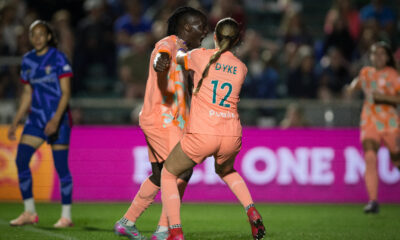
 Orlando Pride2 weeks ago
Orlando Pride2 weeks agoOrlando Pride at North Carolina Courage: Final Score 1-1 as Pride Score a Late Equalizer
-
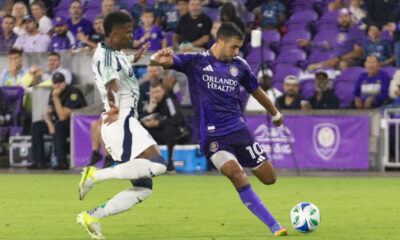
 Photo Galleries1 week ago
Photo Galleries1 week agoOrlando City vs. New England Revolution: Photo Gallery
-
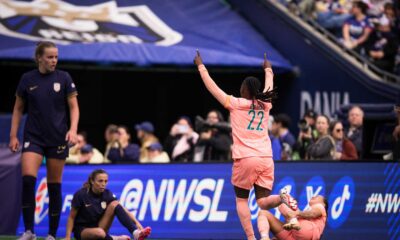
 Orlando Pride2 weeks ago
Orlando Pride2 weeks agoPride Opponents Reducing Barbra Banda’s Available Space in 2025


